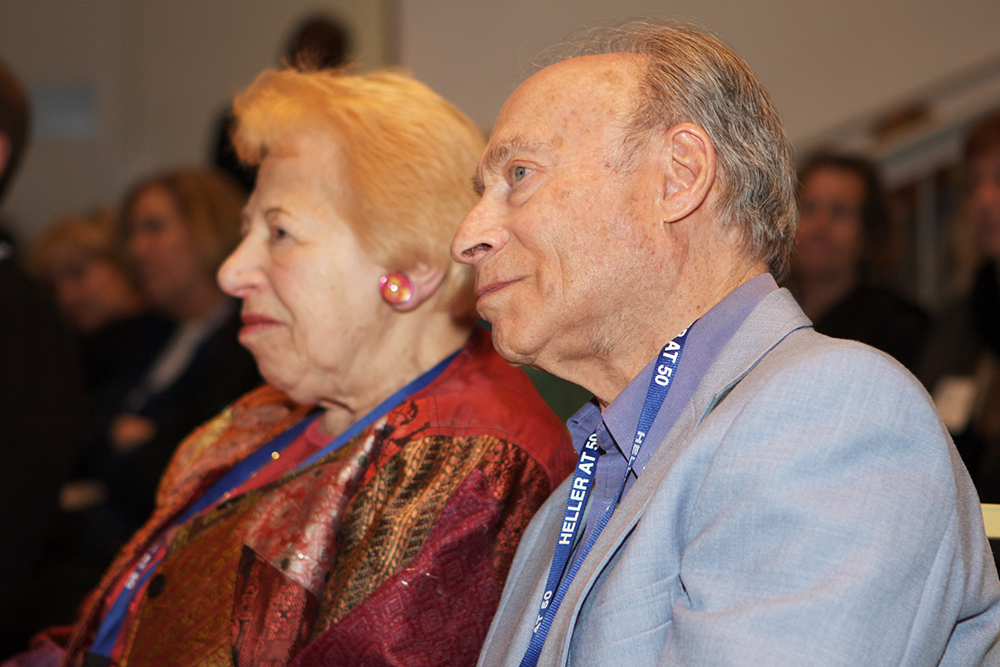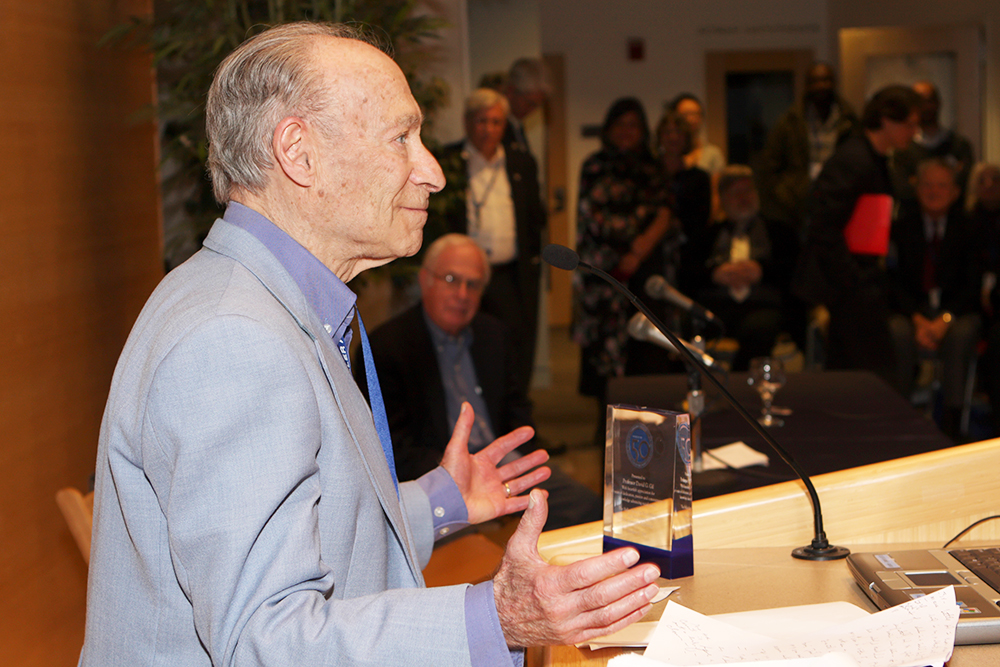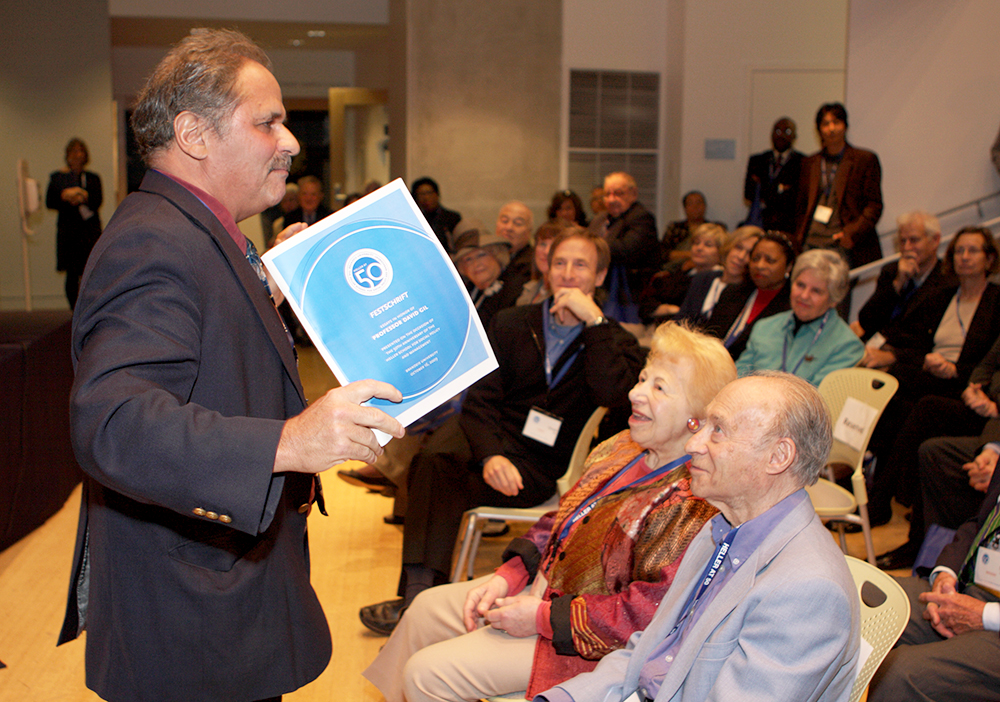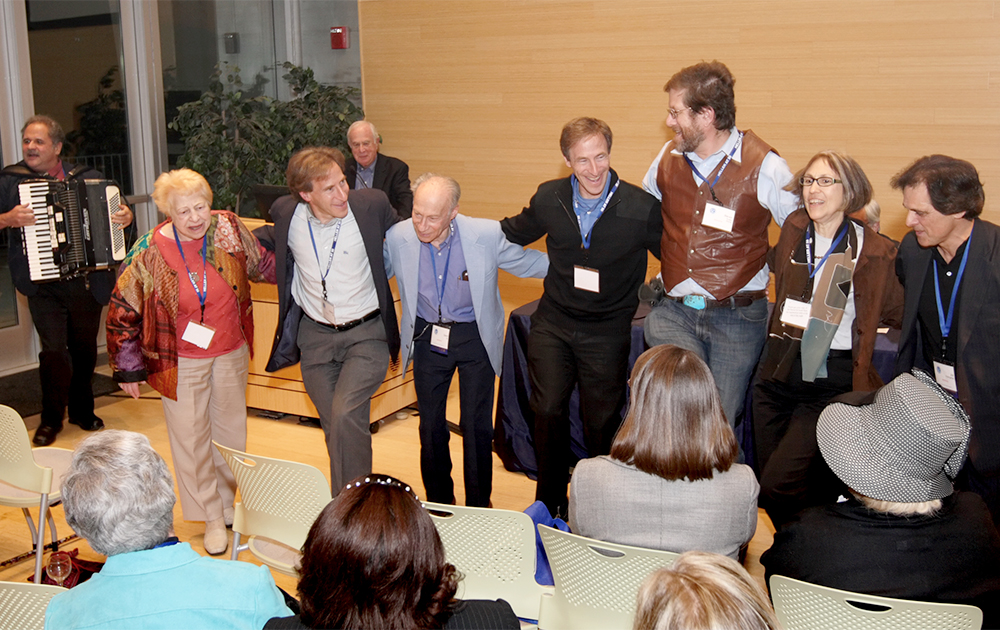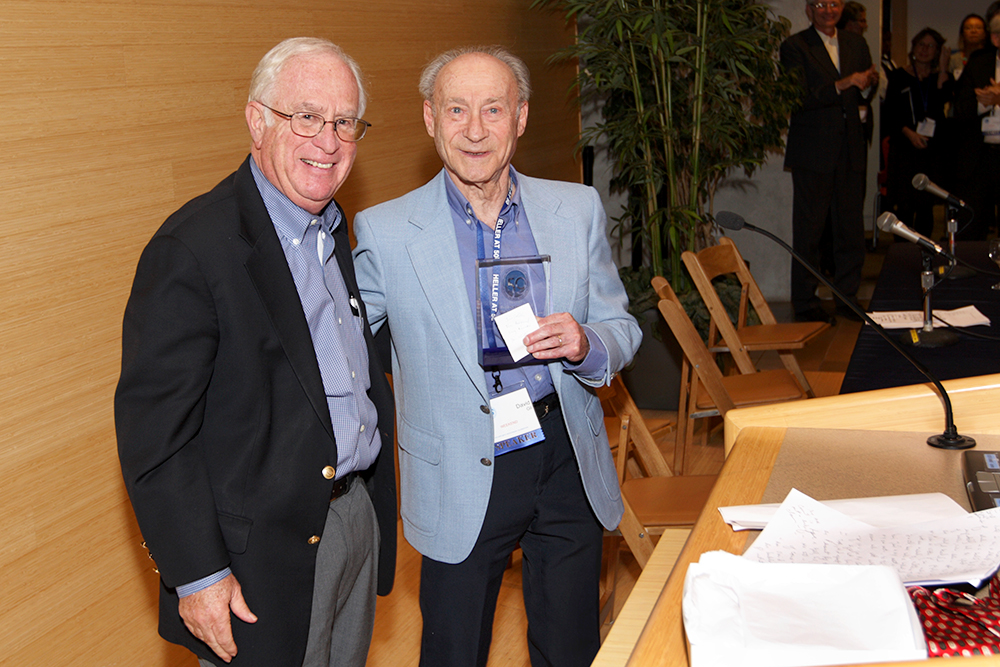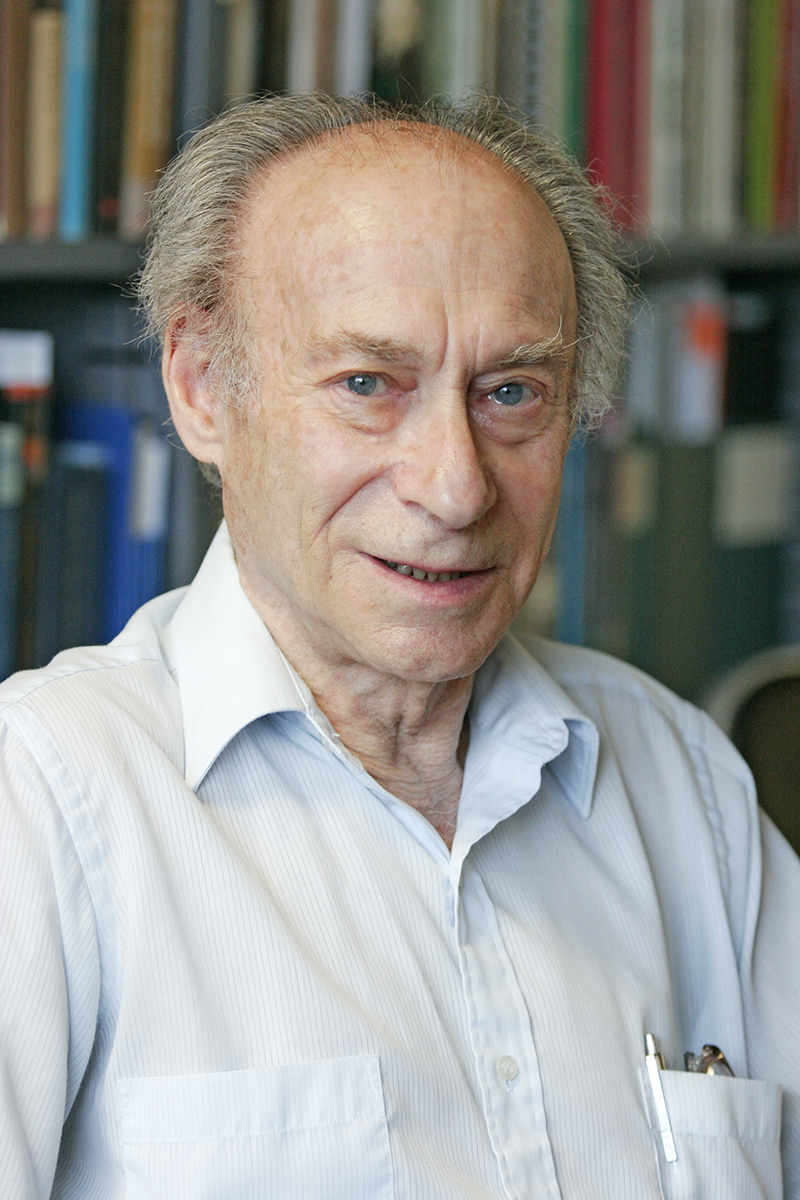
On Saturday, March 6, 2021, Professor Emeritus David Gil passed away at the age of 96. One of Heller’s most beloved and celebrated faculty members, he joined the Heller School a mere five years after its founding, and served on the faculty for 46 years. As the news of his passing began to circulate, dozens of colleagues and former students reached out to offer up stories, memories, and reflections on the impact he had on so many lives. This page contains a selection of those memories.
As an academic, Gil was lauded for his profound thinking on the theory of social change, the roots of violence and oppression, and developing policy strategies to respond to universal human needs. As a professor, he had a singular approach to democratic pedagogy and was known as a dedicated mentor, chairing 85 dissertations and serving as a committee member on 47 more. Many also remarked on his personal story: a child refugee from the Holocaust, he fled Austria at a tender age, emigrating to Sweden and then Palestine. Eventually he and his wife Eva (to whom he was married for nearly 66 years) settled permanently in the United States with their twin sons, Daniel and Gideon. To all, he was known for his passionate dedication to social justice and nonviolence.
Professor Gil retired in December 2010. You can read his obituary in the Boston Globe, or a fuller version of his life story here, as written by his son Gideon Gil.
Memories from the Heller Community
Below are selected excerpts from the many condolence notes received since Professor Gil’s passing. We also encourage you to explore the Festschrift, a collection of essays written by alumni in David Gil’s honor in 2009, as part of the Heller 50th Anniversary celebration.
A Colleague and Friend
“David was truly the social conscience of the Heller School. Like an Old Testament prophet, he would not let a conversation go by without reminding everyone of our collective responsibilities to build a new social order.”
- Laurence Simon, Professor and Director of the Center for Global Development and Sustainability
“David’s hospitality, warmth and good advice were so valuable for me when I arrived as the new Dean at Heller...His comments at seminars, faculty meetings or Monday mornings at coffee with the Dean always left me re-considering my views on what it means to effect social change...When David learned I played the cello, he immediately invited my husband and me for dinner with him and his beloved wife Eva at Brookhaven (where they lived in retirement) followed by a concert at Brandeis. Going to concerts at Brookhaven or Brandeis became a regular treat. I will deeply miss his perspective on social policy, social movements, music and life.”
- Professor Lisa Lynch, former Brandeis Provost and former Heller Dean
Read more quotes
"Professor Janet Giele and I attended a surprise birthday party for David during one of his PhD seminars. We brought in cake and ice cream, and someone asked David to speak about his career. He looked around the table and humbly said, 'I have devoted my life to reducing social injustice, and I have failed.' He helped and touched the lives of so many people over so many years. And owing to his sincere and deep humility, he did not realize the tremendous contributions he had made to his students and people around the world. I regret that I never told him how much he helped me and supported me as his colleague."
- Jon Chilingerian, Professor and Director of the Executive MBA for Physicians
"Within the first week or so when I started as a new assistant professor at the Heller School, I had the brief opportunity to meet with David in his office, although he might have already been retired by then. He would still come to his office in dedication and support for everyone around him. I was struck by the gravitas of the person, the profound suffering he endured, and his incomparable ability to question and seek out the truth of any matter. His fearlessness in speaking truth to power was palpable, authentic. I told him I will be teaching courses on 'global justice.' He stopped me immediately and said - "what does that mean? Global justice? What is global? What is justice?" Since then his questions have stuck with me, motivating me and everyday to continue to probe them and do what I can to make my small contribution as an educator and researcher to advance social justice."
- Rajesh Sampath, Associate Professor of the Philosophy of Justice, Rights, and Social Change
“He was one for whom time was not an entity. As I knew him, the past, present and future were continuous and coincided in his life activities. Those who knew him know the weight of European history he bore personally as a Jewish Austrian living through World War II. Those years shaped his teaching and his scholarship. His history left him with a certain urgency in his social thought and scholarship. He was confident that we had it in us to transform our future into a non-violent one through our concerted efforts in social policies and institutions.”
- Ivy George, PhD’85
“After his surgery he could not drive, but he wanted to work. He lived near me so I picked him and his walker up in the morning and took him home at night... He would not change offices, so he went up the stairs, very slowly. It was profoundly impressive to see [him] slowly make his way to work every day out of devotion to his students...without fanfare or complaint.”
- Professor Jeff Prottas
“In my first few months working at the Heller School, I had a cubicle in the Heller-Brown building, not far from Professor Gil's office. Members of Heller's administration happened to know that Professor Gil was organizing his book collection in the large bookcase in his office. Knowing it would be futile to talk him out of doing the work himself, and concerned about his safety and well-being, the administrator charged me with standing under Professor Gil as he climbed his bookcase and catch him, should he fall. Without really knowing Professor Gil, I casually walked into his office, said I was there to help, and proceeded to stand under him looking up, ready to catch him. I remember trying to be as dignified about it as possible!”
- Joanne Beswick, MS’12, Executive Administrator to the Dean
“There used to be a mandatory retirement law for university professors born before 1924 requiring them to retire when they turned 70. David was born in 1924 and so was in the first cohort of those allowed to work beyond 70. David continued in the Heller School until his mid-eighties. Throughout that time his intellectual powers and his social commitment remained strong.”
- Barry Friedman, Professor Emeritus
“David was a legend at the school. He developed a cadre of devoted students whose world views were shaped by David’s teachings. And he held his own, especially at faculty meetings. He had such a gentle touch and demeanor. I will miss him greatly.”
- Marty Wyngaarden Krauss, PhD’81, Professor Emerita, former Brandeis Provost and former Heller Interim Dean
“David Gil was the social consciousness of Heller. He always reminded us of the social and economic impacts of policies and programs on the people that were most impacted. His voice will be much missed.”
- Tatjana Meschede, Senior Scientist and Associate Director of the Institute for Economic and Racial Equity
“There was no such thing as a casual conversation with him. I will always remember running into him one morning while rushing to class: he asked, "how are you?", I replied, "halfway between exhaustion and exhilaration." As I tried to move on, he stopped me and said he would like to know more. Why was I tired? What did I find exciting? He went on to say that it is impossible for a thinking person to say they are "fine" and/or "doing well" with all the troubles that surround us. We should engage and share our stories at every opportunity because that's how we build community...that lesson learned, more than 25 years ago, has served me well. I always ask follow-up questions!”
- Susan Curnan, Florence G. Heller Chair, Director of the Center for Youth and Communities
His Contributions to the Field
“Professor David Gil has left us an unparalleled legacy of wisdom, liberation, and love. He embodied the wisdom the poet Kahlil Gibran described, “the teacher is indeed wise if he does not bid you enter the house of his wisdom but rather leads you to the threshold of your own mind.” Through his visionary and democratic pedagogy, David not only led hundreds of students to the threshold of our own minds, but also to the threshold of our own hearts. In so doing, he gave us a glimpse of what liberation for our communities, our world could look like. He was concerned with more than our intellects and cared deeply for our full humanity. David’s unflinching courage and laser-sharp analysis of injustice made him the conscience of the Heller School for several decades. His teachings of justice and love will remain alive for years to come as they continue to inspire us, his students, to work towards justice.”
- Alexandra Pineros-Shields, PhD’07, Adjunct Senior Lecturer
Read more quotes
“I learned of David Gil's reputation as a force at the Heller School when I was contemplating a move back to Boston in the early 80s. Some of his former students were then in Washington in government positions, and across the board they commented on how meaningful to them it had been to have had the experience of having David as a professor...not that they always agreed with him, but that he always made them think more broadly and in a more nuanced way on the topic at hand. This too became my experience...David made me think in ways that I might not have done otherwise.”
- Connie Horgan, Professor, Director of the Institute for Behavioral Health and Co-Chair of the Schneider Institutes for Health Policy and Research
“His conception of social welfare was informed by his commitment to human rights and social justice. David’s writing, and his students who graduated from the Heller School who became deans and professors in schools of social work in the United States and abroad, influenced the teaching of social welfare policy and social work education.”
- Connie Williams, PhD’89, Assoc. Professor Emerita
“I cannot prove that he is responsible for the changes that have occurred since the 1960s in the treatment of social policy by social workers and sociologists. But I do observe that many of his then "way out" ideas have now come into their own. Chief among them is his insistence that our collective values about equality and social justice should be the guiding stars for the design and analysis of social policy, and that our goal as social scientists and policy analysts should be to improve the society rather than simply analyze its problems.”
- Janet Giele, Professor Emerita
“We join the voices of so many over the decades whose understanding of and commitment to social justice was profoundly influenced by having Professor Gil as a beloved mentor, stellar educator, and inspiration. Many decades ago, Professor Gil had students who returned from their prestigious education at Brandeis to become directors at the CSULB School of Social Work: Dr. James Kelly, Dr. John Oliver, and the late Dr. Rebecca Lopez…At our School of Social Work, many hundreds of students continue to be inspired by the work of Professor Gil in their MSW policy and thesis courses.”
- Eileen Mayers Pasztor, Professor Emerita CSULB School of Social Work; Former and current School of Social Work Directors: Drs. James Kelly, John Oliver, Nancy Meyer-Adams; and Policy Sequence Faculty: Drs. Keyon Anderson, Ruth Chambers, Venetta Campbell, Lisa Jennings, Dan Jimenez, Mimi Kim, Elizabeth Pringle-Hornsby, Janaki Santhiveeran, and Shannon Crotts.
A Teacher and Mentor Like No Other
“Participatory democracy and non-violence were not merely talking points for Professor Gil... At the start of term he would hand out a minimal syllabus describing the course and stating the class texts that we would use, and he would tell us that we were free to make up our own course requirements. There would be no exams. He informed us that despite our choice of workload we would all be getting the same grade. His courses were experiments in the human potential to do well for self and others if one was freed from the constraints of competition and conflict. His convictions and confidence proved him right. His pedagogical philosophy defied the common calculation that people are essentially selfish and greedy, caring only about personal advancement. I remember doing some of my best work in the graduate program not for the sake of the grade but because I loved what I learned and took pride in my work. I worked hard despite the evaluative outcome. And I was not the only one. Every student in the class appeared to turn in their best work.”
- Ivy George, PhD’85
Read more quotes
“David taught me the importance of being student-centered. He told me ‘listen to your students.’ Whenever I attended his seminar on social policy, I was in awe of his ability to listen deeply to his students. He ran his seminar with everyone sitting around a very large, oblong table. And you felt like you were in a boardroom of a company of equals. He gave the PhD students freedom to read, to think, to question, and to discuss ideas. When his students asked ‘What should I read?’ he sometimes would say “read what you think is important for your work.”
- Jon Chilingerian, Professor and Director of the Executive MBA for Physician
“He was always able to draw out the ideas of his students, challenge them to think about how to promote social justice, and keep them involved in the discussion...He was always very supportive of his students. But he also examined their work critically, guiding them to make sound arguments supported by good evidence.”
- Barry Friedman, Professor Emeritus
“I am pretty sure that he led far more dissertations than any other professor in Heller history. In his apartment in Brookhaven he had them all lined up in a section of his library.”
- Walter Leutz, PhD’81, Professor Emeritus
“He gave us the freedom to think outside the box during every discussion so that everyone around the table had a voice. He even allowed us to grade ourselves at the end of the semester. Our classroom setup was even unconventional — it was a boardroom format!”
- Abla Tsolu, MA SID’08
“Here was this tiny, petite man, whose voice never went above librarian level, and yet, he could stop us all in our tracks with his provocative statements and probing questions. His class was incredibly formative to my Heller education, and I still treasure all of the readings.”
- Sarah Winawer-Wetzel, MBA’09
“David Gil was an inspiring teacher whose vision of equality and justice and determination to fight for it never faltered.”
- Ruth Brandwein, PhD’78
“I will never forget my first day at Heller, back in 1987, when at an orientation he said: “the homeless are victims of capitalism.” I was impressed. Those simple words further cemented my respect for him, as I was also aware of his scholarship, particularly unemployment as a predictor of domestic violence...I have so many fond memories of literally spending hours in his office, running (what I thought was) my “puerile” work before this intellectual giant for his feedback, which he gave generously and without hesitation.”
- Joseph Wronka, PhD’92
“David Gil taught a course entitled “Work and Inequality” where we interrogated hierarchical and oppressive work structures and the prevalence of low wage labor in neo-liberal capitalist systems. One day, while on break, some of my classmates and I were talking to the janitor about what we had been discussing in class. We invited the janitor to join the second half of the class, and we knew that David would be fine with that. The type of democratic pedagogy that I learned from David Gil has been instrumental in the way that I understand myself as an educator.”
- Alexandra Piñeros Shields, PhD’07, Adjunct Senior Lecturer

